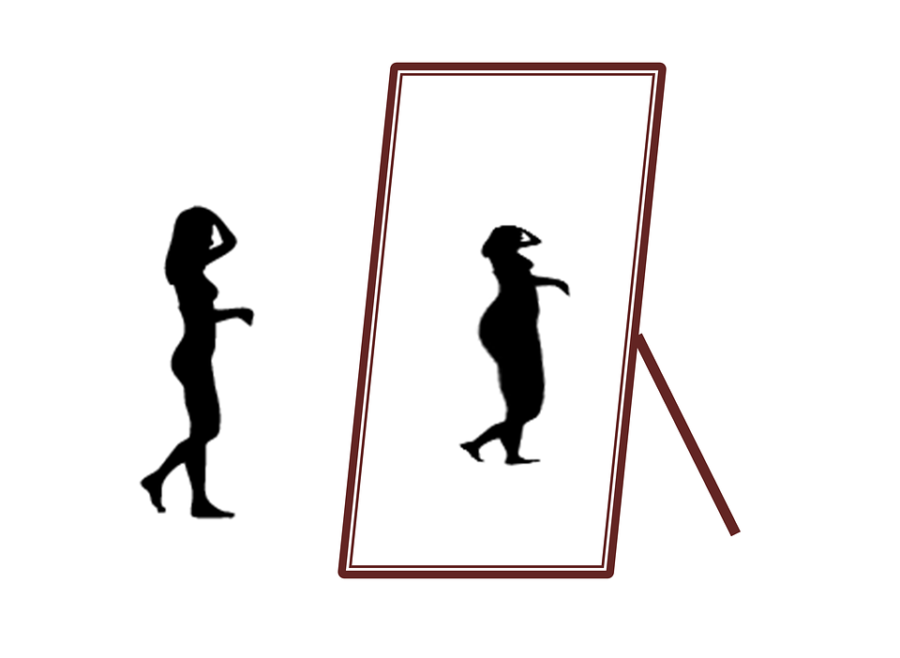Catherine Gagulashvili culture editor
Mikaela Rabizadeh opinion editor
We’ve grown up seeing our favorite celebrities, childhood heroes and admired fashion models on the covers of tabloids and magazines, embodying the “perfection” expected of a CoverGirl. No blemishes, no wrinkles, no flaws. The normalization of unrealistic beauty standards has driven many teens to flock to Photoshop and editing applications to achieve what society tells them is perfection.
Photo enhancement has been around since the 80s, following the creation of Adobe Photoshop. However, as our begin to revolve around the iPhone, the use of such applications has shifted from being utilized in a professional setting to being used anywhere and everywhere; it’s never been at our fingertips. The widely used photo editing application FaceTune has become so prominent in social media culture that “facetuning” has become a verb alongside “googling” and “ubering.” Twenty-five percent of the student body* uses FaceTune, whether that be for smoothing acne or altering a body part.
“Everybody does it now. It’s basically all over my [Instagram] feed,” junior Erica Dennis said. “It’s like a never-ending cycle where girls feel like they constantly have to warp themselves to resemble models whose photos are likely photoshopped themselves.”
This prominence of Photoshop has been cultivated by the ever-increasing cohort of social media influencers. Social media users, notably girls, sometimes conclude they must resemble famous models and/or influencers to be beautiful and thus try to recreate the already touched-up images they see.
Out of the students who claim to use FaceTune, 28 percent have admittedly used the app to alter photos posted on social media. Because these students essentially alter their photos to impress social media followers, it is evident that there is a culture surrounding FaceTune and its growing normalization.
“I’m sure the intentions for using the feature varies. Some may use it to fix practical features of the photo that seems to appear odd or ruin the visual quality of the photo. Others may want to design themselves so that online they contain the features that they otherwise lack in real life,” senior Lisa Park said. “This could probably root from trying to portray themselves the way they want to be seen by others in reality. Generally, it is seen as a disgrace to manipulate or edit one’s image to their own taste, but like I said before if it is done in moderation and if it doesn’t defer too much from the original photo itself, then people should be able to do what they want.”
What does the student body think about FaceTune?
Based on our survey, girls generally are more understanding of the reasons one would defend using FaceTune and Photoshop. For many, it is simply a way to touch-up minor insecurities, such as whitening teeth or removing a pimple.
“If people want to use it to make themselves look or feel better then they should be able to. They aren’t a product so it’s not like it’s ‘false advertisement.’ They’re just showing themselves in a way that makes them happy,” sophomore Leila Nourmand said.
Twenty-seven percent of surveyed boys, however, view photoshop as lying to an audience, unacceptable or as “catfishing.” The male demographic, including junior Jared Kurtz, is less empathetic to those who justify the use of FaceTune and believe it is a scam “to get likes on [Instagram].”
Growing photoshop culture leads to insecurities, eating disorders

While fixing minuscule details about a photo can be argued as acceptable, mass editing and re-shaping of one’s body have negative effects on self-image. Out of the students who claim to use FaceTune, 20.9 percent use the app to edit his/her body in some way. This demands action considering the photoshopping of one’s body is correlated to one of greatest epidemics of our generation: eating disorders. Magazines often touch up models; the evolution of photoshopping a model can be found here. This constant altering of bodies in the media has translated to some women becoming insecure about their own bodies, and even worse, developing eating disorders. A study on the effect of manipulated Instagram photos on adolescent girls analyzed how the manipulation of photos of peers led to cognitive consequences on body image. Project EAT reported that 19 percent of high school girls reported chronic dieting and 57 percent engaged in unhealthy weight control behaviors.
“A between-subject experiment was conducted in which 144 girls (14–18 years old) were randomly exposed to either original or manipulated (retouched and reshaped) Instagram selfies. Results showed that exposure to manipulated Instagram photos directly led to lower body image,” the study found.
Regardless of the detrimental effects on mental health, self-image and overall well-being that altering photos has on those who use it, some have a difficult time letting go of this deleterious habit, simply because if they stop using it, they will feel lesser than others.
“I use it because other people use it,” senior Jessica Sater said. “I know that sounds awful, but when you are the only one not using it, then you just end up feeling bad that you don’t always look as perfect as your friends do.”
*136 students were surveyed
Categories:
Era of retouching: FaceTune fuels discourse
May 25, 2018
0
Donate to Highlights
$125
$1000
Contributed
Our Goal
Your donation will support the student journalists of Beverly Hills High School. Your contribution will allow us to purchase equipment and cover our annual website hosting costs.
More to Discover





























